The Potapaco sands of the Nanjemoy Formation in Virginia yield a rich Ypresian fauna. Despite
serious research in the past, a great deal of less studied opinion has crept into the faunal
make-up of these sediments. By creating this page and ascribing names for the former owners
of these teeth, we to are tendering opinions.
Some identifications are straight forward, unanimous opinions across the board - however
many are subject to interpretation and evaluation. An attempt will be made for those species
to point out differing opinions when known. Please feel free to contact us with alternate
opinions or to point out errors.
The Nanjemoy Formation (Early Eocene - Ypresian) is made up of two members, the Potapaco
and Woodstock. The below faunal list is currently skewed by the extensive collecting of Bed "B"
of the Potapaco member. Over time, data from other levels and locales should help bring this
page into balance.
The clayey sands and fauna of the primary collecting locale suggest a near shore (100-200m)
marine environment. This fauna is rich in vertebrate fossils -- producing material from fishes,
reptiles, birds and occasionally, land mammals. Besides abundant chondrichthyan teeth, this
is one of the few locations where sea snake vertebrae may be deemed common.
|
|
|
|
|
 CLICK ON IMAGES FOR ADDITIONAL DETAILS
CLICK ON IMAGES FOR ADDITIONAL DETAILS
unless accompanied by "not linked" icon.
|
| HEXANCHIFORMES |
| Hexanchidae GRAY, 1851 |
| Specimen Required |
|
Notorynchus serratissimus
(AGASSIZ, 1843) - Sevengill shark.
Reported by Kent (1994) as rare in Nanjemoy sediments. | |
 |
|
Hexanchus cf collinsonae
WARD, 1979 - Sixgill shark.
Uncommon in the Nanjemoy, these teeth were originally thought to represent
H. agassizi CAPPETTA, 1976. | |
| SQUALIFORMES |
| Echinorhinidae GILL, 1862 |
 |
|
Echinorhinus priscus
ARAMBOURG 1952 - Bramble shark.
Scarce in Nanjemoy sediments. |
| Squalidae BONAPARTE 1834 |
 |
|
Squalus crenatidens
ARAMBOURG 1952 - Dogfish shark.
Scarce in Nanjemoy sediments. |
 |
|
"Megasqualus" orpiensis
WINKLER, 1874 - Extinct dogfish shark genus.
An uncommon but easily recognized tooth. Kent (in: Weems, et al, 1999) ascribes these
teeth to Squalus crenatidens (ARAMBOURG, 1952).
Cappetta has questioned the validity of the genus Megasqualus. |
 |
|
Isistius trituratus
(WINKLER, 1874) - Cookiecutter shark.
The small fragile teeth of this species are relatively uncommon in Nanjemoy sediments. |
| SQUATINIFORMES |
| Squatinidae BONAPARTE, 1838 |
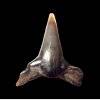 |
|
Squatina "prima"
(WINKLER, 1874) - Angel shark.
Teeth of this design are relatively common in Potapaco sediments. |
| HETERODONTIFORMES |
| Heterodontidae GRAY, 1851 |
 |
|
Heterodontus sp - Bullhead shark.
Scarce in studied Potapaco sediments, more common in other locales. Ward &
Wiest (1990) and Kent (in: Weems, et al, 1999) attribute H. cf lerichei
to the Potapaco. |
 |
|
Heterodontus sp - Bullhead shark.
Scarce in studied Potapaco sediments, these teeth appear to be quite distinct from
the H. lerichei tooth design. |
| ORECTOLOBIFORMES |
| Ginglymostomatidae GILL 1862 |
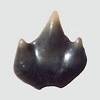 |
|
Delpitoscyllium africanum
(LERICHE 1927) - Extinct nurse shark.
(Formerly placed in Ginglymostoma.)
Uncommon in the Potapaco (Bed "B"), this species is usually associated with
Paleocene sediments. |
 |
|
Ginglymostoma khouribgaense
NOUBHANI & CAPPETTA, 1997 - Nurse shark.
Illustrated specimen from basal Nanjemoy (Potapaco Bed "A") sediments. |
 |
|
Ginglymostoma maroccanum
NOUBHANI & CAPPETTA, 1997. - Nurse shark.
Teeth of this design are scarce in Nanjemoy sediments.
Kent (in: Weems, et al, 1999) attributes teeth of this design
to G. subafricanum LERICHE, 1927.
see: Ward (pers com). |
 |
|
Ginglymostoma sp undescribed - Nurse shark.
A common odontological design in certain Potapaco sediments, these teeth are often
ascribed to G. serra, a Miocene species.
see: Ward (pers com). |
 |
|
Nebrius obliquus
(LEIDY, 1877) - Nurse shark.
Scarce in Nanjemoy, teeth of this design have previously been attributed to
N. blanckenhorni (STROMER, 1905) &
N. thielensis (WINKLER, 1873)
see: Ward (pers com). |
| Rhiniodontidae MÜLLER & HENLE 1839
|
 |
|
Palaeorhincodon daouii
NOUBHANI & CAPPETTA, 1997 - Extinct whale shark.
These teeth are beautiful, quite distinct and less common than those of
P. dartevellei.
|
 |
|
Palaeorhincodon dartevellei
(ARAMBOURG, 1952) - Extinct whale shark.
A scarce to rare Nanjemoy species. |
| LAMNIFORMES |
| In 2005, Cappetta and Nolf released Revision de quelques Odontaspidae (Neoselachii: Lamniformes) du Paleocene et de l'Eocene du Bassin de la mer du Nord. The impact of this paper greatly effects the naming of many of the North American taxa as well. In order to judge it's relevancy and allow others to evaulate their determinations, elasmo.com provides a review of this paper. |
| Cretoxyrhinidae GLIKMAN 1958 |
 |
|
Cretalamna appendiculata
(AGASSIZ 1843) - Extinct mackerel shark genus.
Teeth from this genus are somewhat common in the
Potapaco member of the Nanjemoy Formation. |
| Jaekelotodontidae GLIKMAN 1964 |
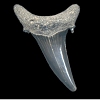 |
|
Jaekelotodus robustus
(LERICHE, 1921) - Exinct lamniform genus.
Teeth of this design are uncommon in Potapaco sediments and were previously attributed to Carcharias. |
| Lamnidae MÜLLER & HENLE 1838 |
 |
|
Isurolamna inflata
(LERICHE, 1905) - Extinct mackerel shark genus.
Uncommon in Nanjemoy sediments. This tooth-design was originally included as
I. affinis (CASIER, 1946), see genus page. |
 |
|
Serratolamna cf gafsana - Extinct lamniform genus.
Uncommon in Nanjemoy sediments. Teeth of this design have previously been referred to as
S. cf aschersoni (STROMER, 1905). |
 |
|
Xiphodolamia ensis
LEIDY, 1877 - Extinct mackerel shark genus.
Teeth from this deep-water genus are uncommon, and have only been found in
Potapaco Bed "C" and the Woodstock members of the Nanjemoy Formation. |
| Mitsukurinidae JORDAN 1898 |
 |
|
Anomotodon cf novus
(WINKLER 1874) - Extinct goblin shark genus.
Teeth from this species are common in the Nanjemoy. |
 |
|
Anomotodon cf sheppyensis
(CASIER 1966) - Extinct goblin shark genus.
Teeth of this design were first recognized as a distinct species by Cunningham
and Ward. They appear to be somewhat common in the Nanjemoy of Potapaco Bed B. |
| Odontaspididae MÜLLER & HENLE 1839 |
| * * Odontaspis Affinity * * |
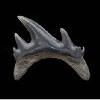 |
|
Odontaspis winkleri
LERICHE, 1905 - Smalltooth sand tiger.
A common species in Nanjemoy sediments. |
 |
|
cf Palaeohypotodus rutoti
( WINKELR, 1874) - Extinct odontaspid genus.
There are differing opinions on the identification
of these teeth. One school of thought considers them to be Palaeohypotodus
rutoti, others say definitely not (see Kent in: Weems, et al, 1999). Uncommon in Nanjemoy sediments. |
| * * Carcharias Affinity * * |
 |
|
Brachycarcharias lerichei
(CASIER, 1946) - Extinct sand tiger-like genus.
Abundant in Nanjemoy sediments. Depending on author, previously attributed to Carcharias, Lamna, Cretalamna or Serratolamna. |
 |
|
Carcharias sp
- Extant sand tiger-like genus.
Teeth comparing well with the Carcharias tooth-design are present in the fauna.. |
 |
|
Hypotodus verticalis
(AGASSIZ, 1843) - Extinct sand tiger genus.
A relatively common tooth-design in certain Nanjemoy sediments. These teeth had been previously assigned to Carcharias hopei |
 |
|
Striatolamia macrota
(AGASSIZ, 1843) - Extinct sand tiger- like genus.
Abundant in Nanjemoy sediments. |
 |
|
Striatolamia striata
(WINKLER, 1874) - Extinct sand tiger- like genus.
These teeth are common, but could possibly represent juvenile S. macrota |
 |
|
Sylvestrilamia cf teretidens
(WHITE, 1931) - Extinct sand tiger genus.
Teeth from this tooth-design are common in the Nanjemoy and were formerly ascribed to Carcharias. |
| Otodontidae GLIKMAN 1964 |
 |
|
Otodus obliquus
AGASSIZ, 1843 - Extinct mackerel shark genus.
Relatively uncommon in both Potapaco sediments and those from the lower
Woodstock. The authors are no longer convinced that the
C. appendiculata-like teeth represent Otodus
juveniles. |
 |
|
Carcharocles aksuaticus
(MENNER, 1928) - Extinct megatoothed mackerel shark.
Uncommon in the Woodstock member of Nanjemoy. These teeth had previously been
ascribed on this page to O. subserratus. |
 |
|
Carcharocles auriculatus
(BLAINVILLE, 1818) - Extinct megatoothed shark.
Uncommon in Nanjemoy sediments and limited to the upper Woodstock Member.
Adjoining image from the Nanjemoy of Maryland. |
| CARCHARINIFORMES |
| Scyliorhinidae GILL, 1862 |
 |
|
Scyliorhinus cf entomodon
NOUBHANI & CAPPETTA, 1977 - Catshark.
Relatively common in certain Potapaco (Bed "B") sediments. |
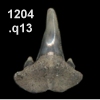 |
|
Premontreia cf degremonti
CAPPETTA, 1992 - Extinct catshark genus
Relatively common in certain Potapaco (Bed "B") sediments. |
 |
|
Premontreia cf subulidens
(ARAMBOURG, 1952) - Extinct catshark genus
Uncommon in Potapaco (Bed "B") sediments.. |
| Triakidae GRAY, 1851 |
 |
|
Triakis sp - Houndshark.
Somewhat uncommon in Nanjemoy sediments, teeth of this design were originally included as
Scyliorhinus. Cappetta and Noubhani both suggested Triakis
undetermined for these teeth. |
 |
|
Pachygaleus lefevrei
(DAIMERIES, 1891) - Extinct houndshark genus.
Formerly ascribed to Galeorhinus, teeth of this species are common in Potapaco sediments. |
 |
|
Galeorhinus aff ypresiensis
CASIER, 1946 - Tope Shark
Common in Nanjemoy sediments. |
| Carcharhinidae JORDAN & EVERMANN, 1896 |
 |
|
Abdounia beaugei
(ARAMBOURG, 1935) - Extinct requiem shark genus.
Abundant in Nanjemoy sediments. |
 |
|
Abdounia undesc
- Extinct requiem shark genus.
Common in Potapaco Bed "B" sediments. |
 |
|
Abdounia recticona (WINKLER, 1873)
- Extinct requiem shark genus.
Not found by the authors in Potapaco Bed A & B sediments of Stafford Co. VA,
this species has been collected in Woodstock member deposits. Kent (in: Weems, et al, 1999)
reports this species from Potapaco Bed B. |
 |
|
Galeocerdo latidens
(AGASSIZ, 1843) - Tiger shark
As is the case with A. recticona, this species has been found in the
Woodstock member of the Nanjemoy. |
 |
|
Physogaleus ?secundus
(WINKLER, 1874) - Extinct ground shark genus.
Abundant in Nanjemoy sediments. Specimens of the P. tertius tooth-design also present. |
 |
|
Rhizoprionodon sp
- Sharpnose shark
Uncommon to scarce in Nanjemoy sediments. |
| PRISTIFORMES |
| Pristidae BONAPARTE 1838 |
 |
|
Pristis cf lathami
GALEOTTI, 1837 - Sawfish.
Uncommon in Nanjemoy sediments, larger rostral teeth of this species are quite
distinctive. In addition to adult teeth,
neonate teeth are found in Potapaco Bed B sediments. |
 |
|
Anoxypristis sp - Sawfish.
Uncommon in Nanjemoy sediments, this rostral tooth variation likely equates with
Kent's (1999) A. mucrodens (WHITE 1926) |
| RAJIFORMES |
| Rhinobatidae MÜLLER & HENLE 1838 |
 |
|
Rhinobatos sp
- Guitarfish.
Relatively uncommon in Nanjemoy (Potapaco Beds A & B) sediments.
Ward & Wiest (1990) reported R. bruxelliensis
(JAEKEL, 1894) from the Woodstock. |
| Rajidae BLAINVILLE 1816 |
 |
|
"Raja" sp
- Skate.
 A scarce genus in Nanjemoy sediments, illustrated example from Potapaco Bed "A". A scarce genus in Nanjemoy sediments, illustrated example from Potapaco Bed "A". |
| MYLIOBATIFORMES |
| Uncertain |
 |
|
Meridiania convexa
CASE 1994 - Extinct ray genus.
Scarce and usually well worn in Potapaco Bed B sediments. |
 |
|
 Uncertain species. Illustrated Potapaco Bed "A"
specimen is uncommon in Nanjemoy sediments. We thought this tooth might represent
Eotorpedo, but it was identified by one paleontologist as Heterotorpedo
and by another as Jacquhermania.
Uncertain species. Illustrated Potapaco Bed "A"
specimen is uncommon in Nanjemoy sediments. We thought this tooth might represent
Eotorpedo, but it was identified by one paleontologist as Heterotorpedo
and by another as Jacquhermania. |
| Dasyatidae JORDAN 1888 or dasyatid-like |
 |
|
Hypolophodon cf sylvestris - Extinct stingray genus.
Somewhat common in certain Potapaco sediments. |
 |
|
"Dasyatis" sp - Stingray.
Only three of these have been reported, so must be deemed quite scarce
in Potapaco Bed B sediments. |
 |
|
Coupatezia woutersi
(WINKLER, 1874) - Extinct stingray genus
Abundant in certain Potapaco sediments. Ward & Wiest (1990) reported
this species from the Potapaco & Woodstock members. |
 |
|
Jacquhermania cf duponti
(WINKLER, 1874) - Extinct stingray genus
Relatively common in certain Potapaco sediments. |
 |
|
? Jacquhermania duponti
Uncommon in Potapaco sediments, this tooth-design is reminiscent of extant
gymnurids (Butterfly rays). This likely represents Jacquhermania. |
 |
|
 Heterobatis-like - Extinct ray genus
Heterobatis-like - Extinct ray genus
Common in Potapaco Bed 'B' sediments. Though these teeth appear very
similar to the Moroccan Heterobatis teeth, these may represent
a diffferent genus. |
| Myliobatidae BONAPARTE, 1838 |
 |
|
"Myliobatis" latidens
WOODWARD, 1888 - Eagle ray genus
Isolated teeth from this species are the most abundant myliobatid material in
Nanjemoy sediments. |
 |
|
"Myliobatis" toliapicus
AGASSIZ, 1843 - Eagle ray genus
Teeth from this species are common in Nanjemoy's Potapaco Bed B.
|
 |
|
"Myliobatis" dixoni
AGASSIZ, 1843 - Eagle ray genus
Present but less common than the above myliobatids in Potapaco Bed B.
|
 |
|
Uncertain myliobatid - Eagle ray genus
Uncommon in Nanjemoy sediments, this design was referred to by Kent (1999)
as Aetomylaeus. The authors' are not comfortable with this identification. |
 |
|
Pseudaetobatus sp
CAPPETTA, 1986 - Eagle ray genus
Teeth of this design are uncommon to scarce in Potapaco Bed B. and are
referred to by Kent (1999) as Aetobatus. |
 |
|
Aetobatus irregularis
(AGASSIZ, 1843) - Eagle ray genus
Present in the Nanjemoy, the earliest specimens noted by the authors are from
Potapaco Bed C sediments. Kent (1999) reported species from Potapaco Bed B. |
 |
|
Undescribed myliobatoid - Eagle ray genus.
Known from isolated teeth only (rare), they were originally thought to be "M." nzadinrnsis-like in design. However, based on diagnostic characteristics, it is difficult to determine if these teeth should be placed with the myliobatids or rhinopterids.
|
| Rhinopteridae JORDAN & EVERMANN 1896 |
 |
|
Rhinopterid sp "A" - Cow-nose ray genus
Common in Nanjemoy sediments. |
 |
|
?Rhinopterid sp "B" - Cow-nose ray genus
Common in Nanjemoy sediments. |
 |
|
Rhinopterid sp "C" - Cow-nose ray genus
Common in Nanjemoy sediments. |
| Mobulidae GILL 1893 |
 |
|
Burnhamia sp - Extinct devil ray genus
Abundant in Potapaco sediments. Similar to B. fetahi
CAPPETTA 1985. |
 |
|
Eomobula cf stehmanni
HERMAN et al., 1989 - Extinct ray genus
A single anterior is known by the authors from Nanjemoy sediments (Potapaco, Bed "B").
A myliobatoid lateral, sometimes recovered from these sediments, is thought to also
represent Eomobula. |
 |
|
Archaeomanta melenhorsti
HERMAN, 1979 - Extinct devil ray genus.
Very common in Potapaco 'B' sediments. |
 |
|
 cf Mobula sp - Devil ray.
cf Mobula sp - Devil ray.
Singular specimen known to authors from Nanjemoy sediments (Potapaco, Bed "A").
Specimen should be deemed a possible contaminent unless additional specimen(s)
recovered. |